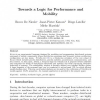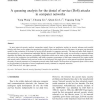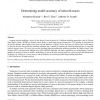1120 search results - page 190 / 224 » Eager Markov Chains |
103
click to vote
ENTCS
2006
15 years 1 months ago
2006
Klaim is an experimental language designed for modeling and programming distributed systems composed of mobile components where distribution awareness and dynamic system architect...
103
click to vote
CN
2007
15 years 1 months ago
2007
In most network security analysis, researchers mainly focus on qualitative studies on security schemes and possible attacks, and there are few papers on quantitative analysis in t...
COGSCI
2007
15 years 1 months ago
2007
Languages are transmitted from person to person and generation to generation via a process of iterated learning: people learn a language from other people who once learned that la...
128
click to vote
CORR
2007
Springer
15 years 1 months ago
2007
Springer
We consider a multi-channel opportunistic communication system where the states of these channels evolve as independent and statistically identical Markov chains (the Gilbert-Elli...
JCSS
2006
15 years 1 months ago
2006
Accurate network modeling is critical to the design of network protocols. Traditional modeling approaches, such as Discrete Time Markov Chains (DTMC) are limited in their ability ...



